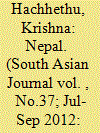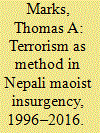| Srl | Item |
| 1 |
ID:
091985


|
|
|
|
|
| Publication |
2009.
|
| Summary/Abstract |
Three years down the revolutionary republican road, many still make de rigueur references to the spectacular progress made by, or since, the revolution, including bringing the peace process to fruition. They, however, enevitably add the rider that, given consensus among key political actors, all problems can be overcome.
|
|
|
|
|
|
|
|
|
|
|
|
|
|
|
|
| 2 |
ID:
118554


|
|
|
| 3 |
ID:
152018


|
|
|
|
|
| Summary/Abstract |
During the period 1996–2006, the Communist Party of Nepal (Maoist) waged overt people’s war to seize state power and institute a new order that realized the party’s understanding of ‘New Democracy’ as posited by Mao Tse-tung. Contextual shifts led to a crucial strategic turning point in September 2005, when the Maoists agreed to a united front with estranged legal parties to oust the monarchy and establish a republic. Though touted as acceptance of political reintegration, the move was tactical rather than strategic. The party had no intention of supporting a parliamentary version of democracy and thus, 2006–2016, engaged in a covert effort to seize power. Central to this effort was the paramilitary Young Communist League (YCL), the members of which responded to inflammatory party verbiage and exhortations with attacks upon rival political actors. These attacks, academically and legally, were terrorism and offered a salient illustration of intra-state unrestricted warfare. Ultimately, organizational, national, and regional circumstances caused the main Maoist movement to move decisively away from its covert approach. By that time, however, radical splinters had embraced the use of terrorism against rival political actors, creating a situation whereby local politics is yet a dangerous endeavor in certain areas and at certain times.
|
|
|
|
|
|
|
|
|
|
|
|
|
|
|
|